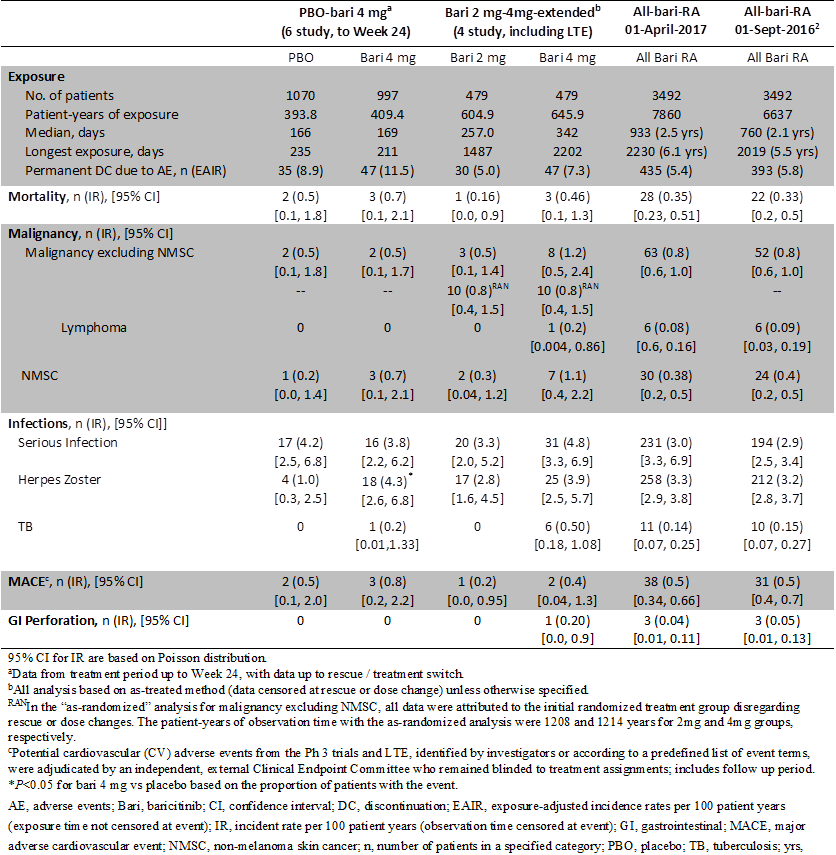Session Information
Session Type: ACR Concurrent Abstract Session
Session Time: 4:30PM-6:00PM
Background/Purpose: Baricitinib (bari), an oral, selective inhibitor of Janus kinase (JAK) 1 and JAK 2, is approved for the treatment of moderately to severely active RA in adults in over 40 countries including European countries, US and Japan. We further describe the drug’s safety profile with updated data from an ongoing long-term extension (LTE) study.
Methods: Long-term safety of once-daily bari was evaluated in the “all-bari-RA” dataset, which includes all patients (pts) with active RA exposed to any bari dose from 8 randomized trials (4 Phase 3, 3 Phase 2, 1 Phase 1b) and 1 LTE study (data up to 01-April-2017). Previous all-bari-RA analyses1 are provided for comparison (data up to 10-Aug-2015 and 01-Sept-2016).2 Dose responses were evaluated based on the 4 Phase 2/3 trials in which pts were randomized to 2 or 4mg including data from the LTE (the “2mg-4mg-extended” dataset). Data were censored at rescue or dose change (as-treated analysis). Because of the latent period for malignancy, 2mg-4mg-extended was also analyzed without censoring for rescue or dose change (as-randomized analysis). Incidence rates (IR) per 100 patient-years (PY) were calculated.
Results: In the current analysis, 3492 pts received bari for 7860 total PY of exposure (an increase in over 1200 PY; 18% from 01-Sept-2016) for up to 6 years (Table 1). Of these, 2723 (78.0%) were treated for at least 52 weeks and 1788 (51.2%) were treated for at least 130 weeks. Adverse events (AEs) IRs did not increase with prolonged exposure (Table 1). Malignancy (excluding non-melanoma skin cancer (NMSC)) IR were 0.5 and 1.2 for 2mg and 4mg, respectively, with as-treated analysis and 0.8 and 0.8 with as-randomized analysis. For the above events, the current IRs in all-bari-RA are similar to those previously reported (Table 1). The following IRs were observed in the current all-bari-RA: gastrointestinal (GI) perforation (0.04), and tuberculosis (TB) (0.14). Fewer than 1% of pts discontinued due to abnormal lab results.
Conclusion: In this updated integrated analysis of patients with moderately to severely active RA, including patients exposed for up to 6 years, baricitinib maintained a safety profile that was similar to that previously reported1,2 acceptable in the context of demonstrated efficacy.3,4
To cite this abstract in AMA style:
Genovese MC, Smolen JS, Takeuchi T, Rooney TP, Dickson CL, Yang XY, Saifan C, Cardoso A, Issa M, Ishii T, Winthrop K. Safety Profile of Baricitinib for the Treatment of Rheumatoid Arthritis up to 6 Years: An Updated Integrated Safety Analysis [abstract]. Arthritis Rheumatol. 2018; 70 (suppl 9). https://acrabstracts.org/abstract/safety-profile-of-baricitinib-for-the-treatment-of-rheumatoid-arthritis-up-to-6-years-an-updated-integrated-safety-analysis/. Accessed .« Back to 2018 ACR/ARHP Annual Meeting
ACR Meeting Abstracts - https://acrabstracts.org/abstract/safety-profile-of-baricitinib-for-the-treatment-of-rheumatoid-arthritis-up-to-6-years-an-updated-integrated-safety-analysis/

